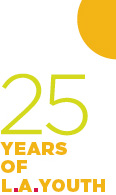Celebrating L.A. Youth’s 25th anniversary: Foster Youth Writing Project
 I was desperate for a getaway from my problems. In class a day or two later, I took a large safety pin, stuck it down hard on my arm and dragged it until it bled. The pain was soothing. Feeling the blood run down my arm took me to a natural high. It hurt, but it didn’t hurt compared to what I was going through.
I was desperate for a getaway from my problems. In class a day or two later, I took a large safety pin, stuck it down hard on my arm and dragged it until it bled. The pain was soothing. Feeling the blood run down my arm took me to a natural high. It hurt, but it didn’t hurt compared to what I was going through.
From “Cutting away the pain” by Karina Onofre, 16, The Linden Center, November-December 2004
My clothes were dirty and ripped. I smelled like piss and body odor. I would eat out of garbage cans or steal food. Before I started living on the streets I was a good 135 pounds. I lost a lot of weight. I looked like a twig. I would go a few days without eating. For the first couple days I would be starving, but on the third day the hunger went away and I couldn’t feel anything.
From “My life on the streets” by William Dominguez, 18, May-June 2005
My life began changing in a positive way as soon as I moved in. My foster dad told me that my only responsibility was my education. I had been getting Ds in almost every subject. I liked school, but when I didn’t understand something, I would easily give up. No one in my other foster homes helped me with my homework. My foster dad would sit with me every night to help me. After a few months, I became interested in school and became one of the top students in my class.
From “They got me through” by Teresa Hidalgo, 18, Sierra Vista HS, September 2005
When I was 14, I started to hear voices again. I’m not sure why, maybe it was caused by stress from arguing with my mom over little stuff. I’d hear screaming. It was worse than before, more violent and intense. For the second time, I grabbed a knife one day and held it in my hand in a trance until I dropped it. At the hospital the doctors said I might have schizophrenia. That made me really depressed. To be possibly diagnosed with a mental illness is scary. I wondered if I would be able to do normal things in my life.
From “The voices no one else can hear” by Brian, 16, November-December 2005
I stayed in my room most of the time because I had nowhere to go and nothing to do. In that neighborhood, there are no parks for kids, no community centers, no after-school hangouts. It’s not a normal community. It’s an area where you put your outcasts. Next to skid row are high-rise buildings and prosperity. A few blocks separate skid row from the business area and the fashion, toy and jewelry districts. It amazes me. You have all these stores, banks and businesses, a Macy’s, but once you cross Los Angeles Street you’re in a totally different area. That’s when you start seeing homeless people and prostitutes. Living there, I felt dumped on by society.
From “A world apart” by an anonymous 18-year-old, January-February 2006
At the table in the cafeteria, the other girls would tell stories of good times in their lives. The rules were that you couldn’t talk about getting high or anything negative. I didn’t have any stories. I couldn’t remember a lot of times because I had been high. I missed out on life because I got into drugs at a young age. They would talk about going to the park and actually hanging out, not getting high. I started realizing my whole life was wrapped around drugs. All I could say was, “Me and my brother used to go skating in Panorama City.” I don’t know how people could stand talking to me because I always said the same thing.
From “My life on meth,” author’s name withheld, September 2008
|
A lot of foster youth feel like they aren’t heard by their foster parents and social workers, that when they say something it doesn’t matter. But when foster youth write for L.A. Youth, they’re able to express their feelings. They share their experiences and how they were able to cope with their struggles. By reading these stories, people will understand foster kids better. They come from broken families and bad experiences, they don’t just act out because they’re bad people. In a few of the stories I felt the same way the writers did. They said, “here we go again” when they moved to a new foster home. It’s hard to start over again, new family, new school. The reason why a lot of foster youth don’t succeed in life is that they don’t have support and motivation. “They got me through” shows that a good home is really important in a foster kid’s life and can lead them to a better future. |





